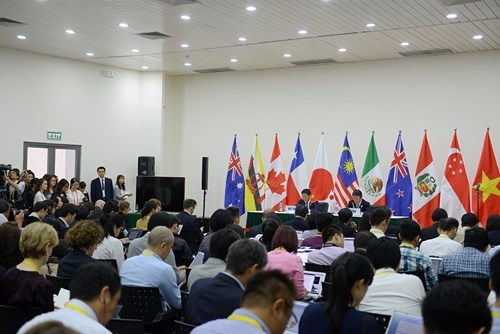



Ministers of 11 countries agreed on the core elements of the CPTPP at their conference
in Danang, Vietnam, November 11, 2017. (Photo: People’s Army Newspaper)
|
Trade ministers of other countries negotiating the trade pact,
namely Australia, Brunei, Canada, Malaysia, Mexico, Japan, New Zealand, Peru,
Singapore and Vietnam, will attend the event. CPTPP was launched a year ago after the US withdrew from the
Trans-Pacific Partnership (TPP) agreement. It sets high criteria in numerous
fields, including labour, the environment, intellectual property, digital
economy and cyber security. Twenty-two provisions of the CPTPP, including sensitive ones
related to intellectual property, were suspended or changed in comparison to
the TPP. The pact is expected to facilitate for the promotion of economic
growth and job generation, poverty reduction, and improvement of people’s
living conditions. It will be a strong message against protectionism, while proving
that an opening economy will benefit member nations, according to
experts. The pact, once signed, will create one of the world’s largest
free trade blocs with a combined market of 463 million people and GDP of
around 10,000 billion USD, accounting for 13 percent of the global GDP. It will bring about important commitments involved in non-tariff
barriers, services, investment and other fields. The pact will come into force 60 days after it is fully ratified
by six of the 11 members. According to New Zealand Trade Minister David Parker, the deal
would give Kiwi businesses preferential access to Japan - the third biggest
economy in the world - Canada, Mexico and Peru for the first time. The deal had also "increased in importance because of
growing threats to the effective operation of the World Trade
Organisation", he said. The Ministry of Foreign Affairs and Trade of NZ estimates, the
deal is expected to give a $1.2 billion to $4b boost to New Zealand's real
gross domestic product. This included almost $86 million in expected tariff savings for
the dairy industry, while the country's exporters would save about $200m in
reduced tariffs to Japan alone.
|
Source: NDO